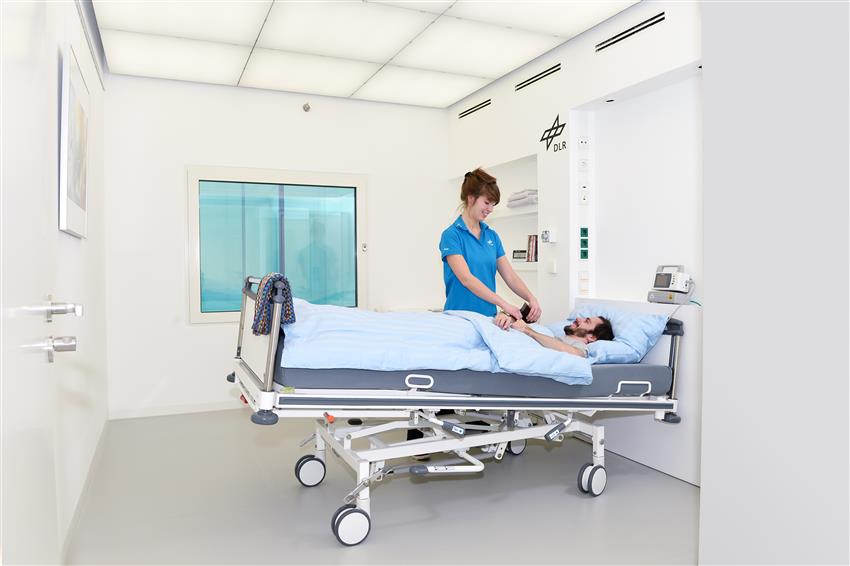Canadian scientists looking to better understand the effects of space on astronauts' bodies

A volunteer participates in an inactivity study by lying in an inclined bed. Remaining in bed for an extended period of time mimics some of the conditions of the space environment. (Credit: DLR)
The Canadian Space Agency is supporting the participation of Canadian researchers to help shed light on how long-duration space flights affect astronauts' health. The twist? These scientists are taking part in experiments that simulate space – right here on Earth.
The grants support a series of bedrest and dry-immersion experiments, in collaboration with the European Space Agency. Both types of experiments create conditions similar to the weightlessness of space, including a shift of fluids toward the head.
As part of bedrest studies, volunteers stay in bed for several weeks without a break, with their heads angled six degrees lower than the rest of their bodies. They eat, sleep, exercise, shower and conduct all other daily activities in this position. This protocol mimics the microgravity environment of space and causes the body to produce many of the same changes.
Six grants awarded are:
| Researcher and institution | Location | Study topic |
|---|---|---|
|
Dr. Andrew Blaber (Co-Investigator), |
Planica, Slovenia |
The team will examine the physiology of blood clotting with volunteers in a 60-day bedrest study to simulate the weightlessness of spaceflight. This information will help us better understand venous clotting in astronauts and patients confined to bed. |
|
Dr. Guy Trudel (Principal Investigator), Ottawa Hospital Research Institute, Ontario |
Planica, Slovenia |
The study will deliver novel and pertinent data on anemia, hemolysis, young, mature and senescent red blood cell populations and spleen changes in 24 participants before, during and after head-down tilt bedrest, with artificial gravity and physical countermeasures in hypoxia. |
|
Dr. Guy Trudel (Co-Investigator), Ottawa Hospital Research Institute, Ontario |
Planica, Slovenia |
The team will test the effectiveness of artificial gravity (AG) and its combination with bike ergometer exercise on several musculoskeletal endpoints compared to controls and previous AG and non-AG countermeasures. Findings will lead to a deeper understanding of microgravity‐induced musculoskeletal changes. |
|
Dr. Guy Trudel (Co-Investigator), Ottawa Hospital Research Institute, Ontario |
MEDES, France |
The team will test the effectiveness of artificial gravity (AG) and its combination with resistive vibration exercise on several musculoskeletal endpoints compared to controls and previous AG and non-AG countermeasures. Findings will help better understand microgravity‐induced musculoskeletal changes. |
|
Dr. Richard Hughson (Co-Investigator), University of Waterloo |
MEDES, France |
In this 60-day study, the team will test the effectiveness of artificial gravity generated on a large centrifuge combined with exercise training as a countermeasure to a loss of cardiovascular fitness as seen during astronaut flights. Changes in blood volume and regulatory hormones will be monitored to see how they contribute to loss of cardiovascular fitness. |
|
Dr. Richard Hughson (Co-Investigator), University of Waterloo |
MEDES, France |
As part of this 60-day study, simultaneous changes within the heart, blood vessels and skeleton in both men and women will be observed to help identify new and important avenues for future spaceflight and health-related research. Additionally, we will evaluate any beneficial effects of physical exercise and artificial gravity during bedrest that may limit the deleterious consequences of inactivity on the human body. |
In dry-immersion studies, volunteers spend about five days floating in tanks of water. The water is kept at a constant, comfortable temperature and is covered with an elastic waterproof fabric to keep the volunteers dry. Only their heads remain outside the tank.
Two grants awarded are:
| Researcher and institution | Location | Study topic |
|---|---|---|
|
Dr. Andrew Blaber (Co-Investigator), Simon Fraser University, British Columbia |
MEDES, France |
The team will examine the physiology of blood clotting in participants in dry-immersion tanks. This information will help better understand venous clotting in astronauts and hospitalized patients confined to bed. |
|
Dr. Carolyn McGregor (Principal Investigator), University of Ontario Institute of Technology, Ontario |
MEDES, France |
The team will explore an innovative computing approach for autonomous health monitoring utilizing big data analytics in an all‐female crew. |
These unique approaches to space science will help Canadian researchers learn more about how the body adapts to weightlessness, and will eventually help find countermeasures for long-duration space missions. All studies are expected to be completed by .